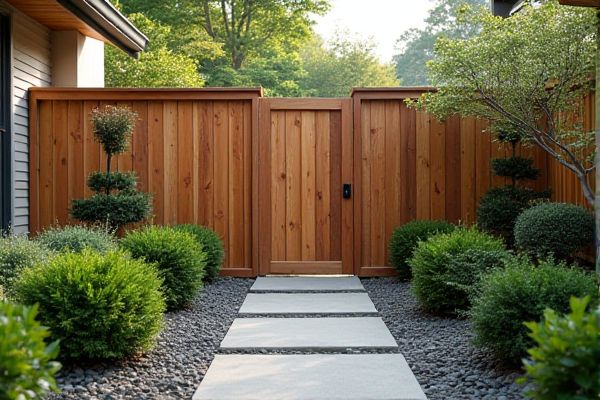
Privacy fences offer a sturdy, long-lasting barrier that enhances security and blocks visibility entirely, while privacy screens provide flexible, temporary solutions ideal for small spaces or seasonal use. Discover which option best suits Your needs by exploring the detailed comparison in the rest of the article.
Table of Comparison
| Feature | Privacy Fence | Privacy Screen |
|---|---|---|
| Purpose | Permanent boundary for privacy and security | Temporary or movable privacy barrier |
| Material | Wood, vinyl, metal, or composite panels | Mesh, fabric, or plastic screens |
| Installation | Requires digging post holes and securing panels | Attaches to existing structures or portable stands |
| Durability | Long-lasting, withstands weather conditions | Less durable, suited for short-term use |
| Cost | Higher initial investment | Lower cost, budget-friendly option |
| Maintenance | Requires occasional cleaning and repairs | Minimal maintenance needed |
| Privacy Level | High privacy with solid panels | Moderate privacy, depends on material opacity |
| Customization | Custom sizes, styles, and colors available | Limited customization options |
Privacy Fence vs Privacy Screen: Key Differences
A privacy fence offers a permanent, solid barrier typically made from wood, vinyl, or metal, providing robust security and noise reduction for your outdoor space. Privacy screens are portable and flexible, often constructed from fabric or mesh materials, ideal for temporary or decorative use without obstructing airflow entirely. Your choice depends on whether you prioritize long-term privacy and durability or temporary, adjustable privacy solutions.
Material Options for Privacy Fences and Screens
Privacy fences commonly use durable materials such as wood, vinyl, and composite, offering long-lasting protection and natural aesthetics for your outdoor space. Privacy screens often incorporate lightweight options like bamboo, fabric mesh, and metal panels, allowing for flexible installation and easy adjustments. Choosing the right material depends on your desired level of privacy, maintenance preferences, and overall design needs.
Installation Process: Fence vs Screen
Installing a privacy fence typically involves digging post holes, setting posts in concrete, and attaching panels or boards, requiring more time, tools, and effort. A privacy screen installation is generally quicker and simpler, often involving mounting lightweight panels or fabric onto existing structures like decks or railings. While fences provide a permanent, structural barrier, privacy screens offer flexibility and ease of setup for temporary or adaptable privacy solutions.
Durability and Maintenance Comparison
Privacy fences are typically made of robust materials like wood, vinyl, or metal, offering high durability and requiring minimal maintenance such as occasional painting or sealing. Privacy screens, often composed of fabric, bamboo, or lightweight panels, may need more frequent replacement and cleaning due to their exposure to weather conditions. Choosing between the two depends on your preference for long-term durability versus ease of installation and upkeep.
Cost Analysis: Privacy Fence vs Privacy Screen
A privacy fence typically requires a higher upfront investment due to materials like wood, vinyl, or metal, installation labor, and potential permits, making it a long-term solution with durable benefits. Privacy screens are generally more cost-effective initially, as they are often made from fabric, bamboo, or artificial greenery and can be easily installed or moved, but they may need frequent replacement or maintenance. Your choice depends on budget, desired longevity, and maintenance willingness, with fences offering greater stability and screens providing flexible, economical privacy options.
Aesthetic Appeal: Styles and Customization
Privacy fences offer a wide range of styles including wood, vinyl, and metal options, allowing homeowners to customize colors, textures, and panel designs to match their landscape. Privacy screens provide versatile aesthetic solutions with materials such as lattice, fabric, or metal, often available in adjustable and portable formats to enhance outdoor space flexibility. Both options cater to diverse design preferences, enabling tailored visual appeal while ensuring effective privacy.
Privacy Levels: Effectiveness and Limitations
Privacy fences provide a high level of privacy by creating a solid, physical barrier that blocks visibility and noise more effectively than privacy screens. Privacy screens, often made from mesh or fabric, offer moderate privacy and are better suited for temporary or decorative use but may allow some visibility and airflow. Your choice depends on the desired privacy level, permanence, and the specific environment where the barrier will be installed.
Local Regulations and Property Boundaries
Local regulations often dictate the height and materials allowed for privacy fences, requiring homeowners to obtain permits and adhere to setback rules to avoid encroaching on property boundaries. Privacy screens, being less permanent structures, may face fewer restrictions but still must comply with local zoning laws and neighborhood covenants to prevent disputes with neighbors. Accurate property boundary surveys are essential before installation to ensure fences or screens do not breach deed lines, helping maintain legal compliance and neighborly relations.
Environmental Impact: Eco-Friendly Choices
Privacy fences, typically made from sustainable materials like cedar or bamboo, offer a biodegradable and long-lasting option with minimal chemical treatments, reducing environmental impact. Privacy screens, often constructed from synthetic materials such as vinyl or plastic mesh, may have a higher ecological footprint due to non-biodegradability and production emissions. Choosing a privacy fence made from recycled or rapidly renewable resources supports eco-friendly landscaping and promotes sustainability in outdoor spaces.
Choosing the Best Option for Your Needs
Choosing between a privacy fence and a privacy screen depends on your specific requirements for security, aesthetics, and installation ease. Privacy fences offer durable, long-term protection with materials like wood, vinyl, or metal, providing a solid barrier against noise and visual intrusion. Privacy screens, often made from lattice, fabric, or bamboo, are versatile and portable solutions ideal for temporary needs or enhancing existing structures without extensive construction.
 homyna.com
homyna.com